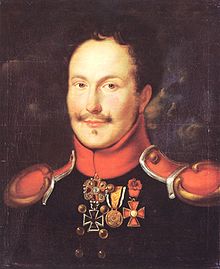Friedrich de la Motte Fouqué
| Friedrich de la Motte Fouqué | |
|---|---|
 |
|
| Born | 12 February 1777 Brandenburg an der Havel, Brandenburg, Prussia, Holy Roman Empire |
| Died |
23 January 1843 (aged 65) Berlin, Prussia, Germany |
| Occupation | Writer, novelist |
| Genre | Fantasy |
| Notable works | Undine |
Friedrich Heinrich Karl de la Motte, Baron Fouqué (12 February 1777 – 23 January 1843) was a German writer of the romantic style.
He was born at Brandenburg an der Havel, of a family of French Huguenot origin, as evidenced in his family name. His grandfather, Heinrich August de la Motte Fouqué, had been one of Frederick the Great's generals and his father was a Prussian officer. Although not originally intended for a military career, Friedrich de la Motte Fouqué ultimately gave up his university studies at Halle to join the army, and he took part in the Rhine campaign of 1794. The rest of his life was devoted mainly to literary pursuits. He was introduced to August Wilhelm Schlegel, who deeply influenced him as a poet ("mich gelehret Maß und Regel | Meister August Wilhelm Schlegel") and who published Fouqué's first book, Dramatische Spiele von Pellegrin, in 1804.
Fouqué's first marriage was unhappy and soon ended in divorce. His second wife, Caroline Philippine von Briest (1773–1831), enjoyed some reputation as a novelist in her day. After her death Fouqué married a third time. Some consolation for the ebbing tide of popular favour was afforded him by the munificence of Frederick William IV of Prussia, who granted him a pension which allowed him to spend his later years in comfort. He died in Berlin in 1843.
For Fouqué's life see Lebensgeschichte des Baron Friedrich de la Motte Fouqué (only to the year 1813), Aufgezeichnet durch ihn selbst (Halle, 1840), and also the introduction to Koch's selections in the Deutsche Nationalliteratur.
After Dramatische Spiele von Pellegrin, his second work, Romanzen vom Tal Ronceval (1805), showed more plainly his allegiance to the romantic leaders, and in the Historie vom edlen Ritter Galmy (1806) he versified a 16th-century romance of medieval chivalry.
...
Wikipedia
